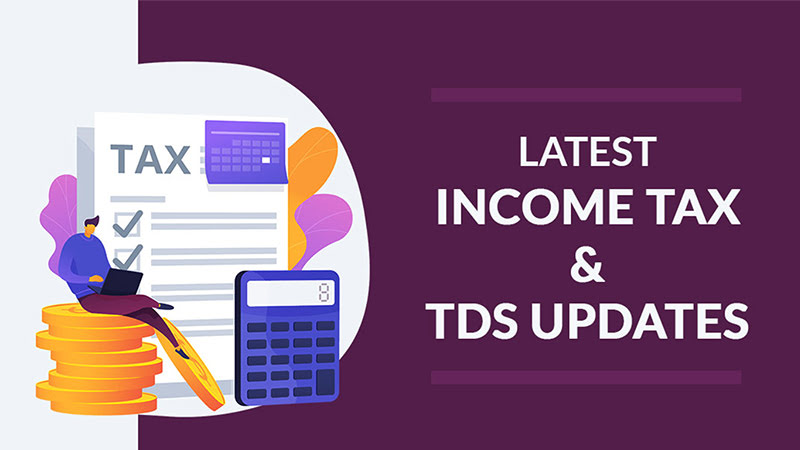India’s income tax is an essential component of the country’s financial system and a significant source of revenue for the government. It is a direct tax on individuals, Hindu Undivided Families (HUFs), businesses, and other entities based on their annual income or profits. How about we investigate this theme in more detail. The substance on this page is planned to give an outline and general direction. It isn’t thorough. For complete subtleties and rules, kindly allude to the Annual Expense Act, Rules, and Notices.
Income Tax Latest Updates
The Indian Income Tax system has seen a few ongoing updates pointed toward working on charge consistence and further developing straightforwardness. One of the huge changes in the monetary year 2023-24 is the presentation of new annual expense pieces under the reconsidered charge system. These slabs have lower tax rates but eliminate the majority of exemptions and deductions. As a result, taxpayers have to choose between the old system, which includes many deductions, and the new streamlined one. Also, the public authority has improved the e-documenting gateway to make it more easy to understand and productive, diminishing the time expected for handling returns and giving discounts.
What Is Income Tax in India?
The central government of India collects income tax as a direct tax from both individuals and businesses. It is the primary source of revenue for the government and is governed by the Income Tax Act of 1961 and administered by the Ministry of Finance’s Central Board of Direct Taxes (CBDT). The funds collected are essential for financing developmental and welfare projects the nation over.
Check Also:-
Significantly Impact your Financial Health
Latest income tax changes for FY 2024-25 is significant for compelling expense arranging and consistence. Grasping the new expense chunks, important rules, and accessible derivations can altogether affect your monetary wellbeing. By following the framed strides for documenting your ITR and using charge saving ventures shrewdly, you can guarantee a smooth and efficient tax filing process, boosting your advantages and limiting your expense obligation. Remain informed, plan early, and pursue informed monetary choices.
Types of Income Tax
- Personal Tax: Applicable to people and Hindu Unified Families (HUFs), it is determined in view of all out available pay, including pay, house property, and capital additions.
- Corporate Income Tax: Exacted on organizations enrolled under the Organizations Act, 2013.
- Capital Gains Tax: Tax on the benefits procured from the offer of capital resources.
- Securities Transaction Tax (STT): Tax on exchanges including protections. capital resources
- Dividend Distribution Tax (DDT): Tax on profits dispersed by organizations.
- Minimum Alternate Tax (MAT): ensures that businesses pay the least amount of tax possible.
- Tax Deducted at Source (TDS): Tax gathered at the kind of revenue.
Check Also:-
Tax Budget New Updates
- of Existing Tax Rates: Rates for direct and indirect taxes have not changed.
- Tax Exemption for Lower Income Groups: People procuring up to Rs 7 lakh every year are excluded from tax.
- Withdrawal of Tax Dispute Provisions: Debate claims up to Rs 25,000 for FY 2009-10 and Rs 10,000 for FY 2010-11 to 2014-15 are removed.
- Enhanced Leave Encashment Limit: Raised from Rs 3 lakh to Rs 25 lakh for non-government representatives.
- Reduction in TDS Rate on EPF Withdrawal: Decreased from 30% to 20%.
- Standard Deduction for Salaried Employees: Rs 50,000 allowance under the new tax regime.
- Reduction in Highest Surcharge: From 37% to 25% for incomes over Rs 5 crore.
- Opt-Out Provision for New Tax Regime: Default new expense system with a choice to quit before the ITR recording due date.
Who Should Pay Income Tax?
- Individuals: Occupants pay tax on overall pay; non-inhabitants on Indian pay.
- HUFs: taxed independently of each member.
- Firms, Companies, and LLPs: Tax based on profits.
- Other Entities: Trusts, associations, and institutions.
Check Also:-
Final Words
The deadline for filing Income Tax Returns (ITRs) remains July 31st for people and October 31st for organizations, with strict penalties for late filings to empower convenient consistence. In addition, there have been expanded measures to extend the expense base and forestall tax avoidance, including more rigid announcing prerequisites for high-esteem exchanges and the required connecting of Skillet with Aadhaar for more noteworthy straightforwardness. These updates mirror the public authority’s continuous endeavors to modernize the duty framework, making it more open and impartial for all citizens.
